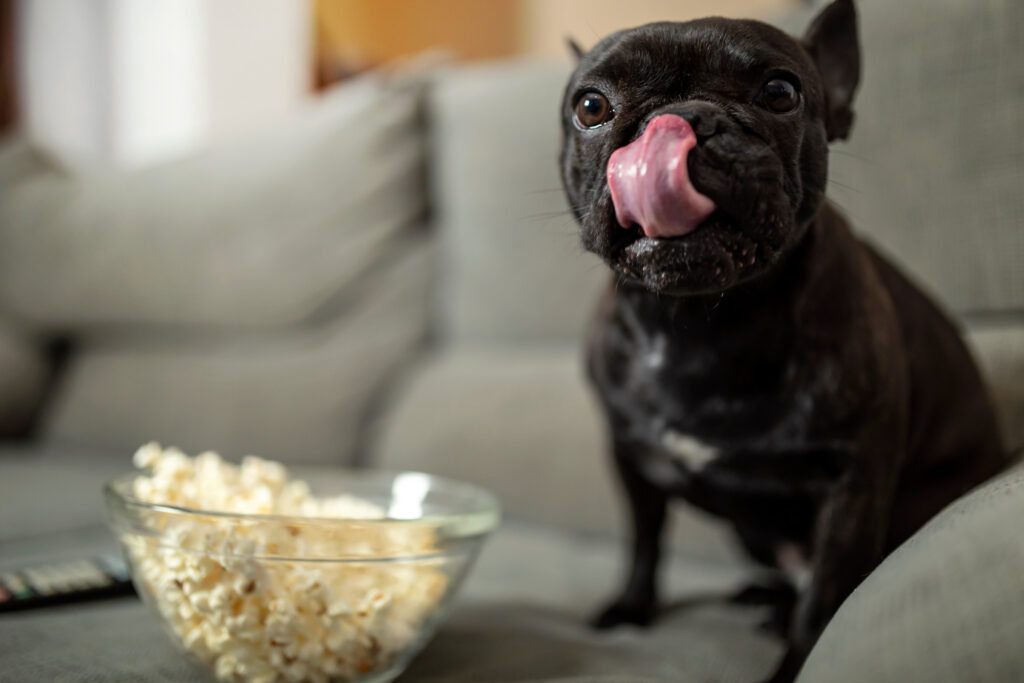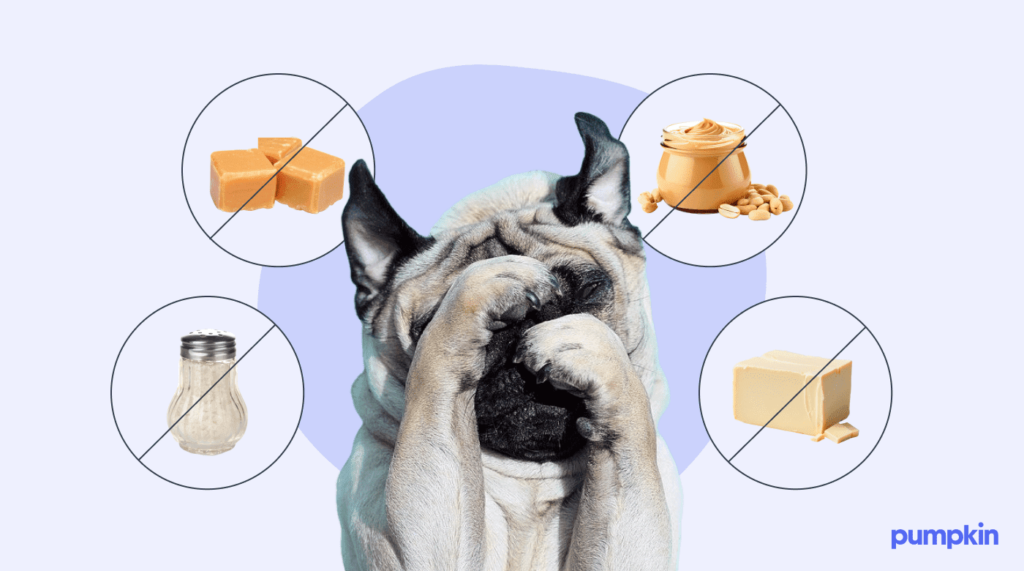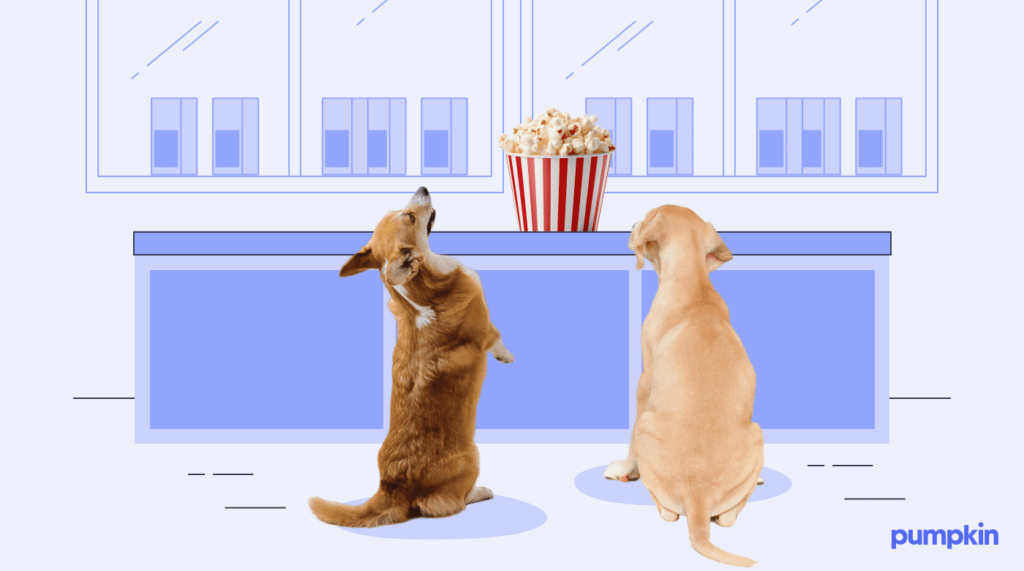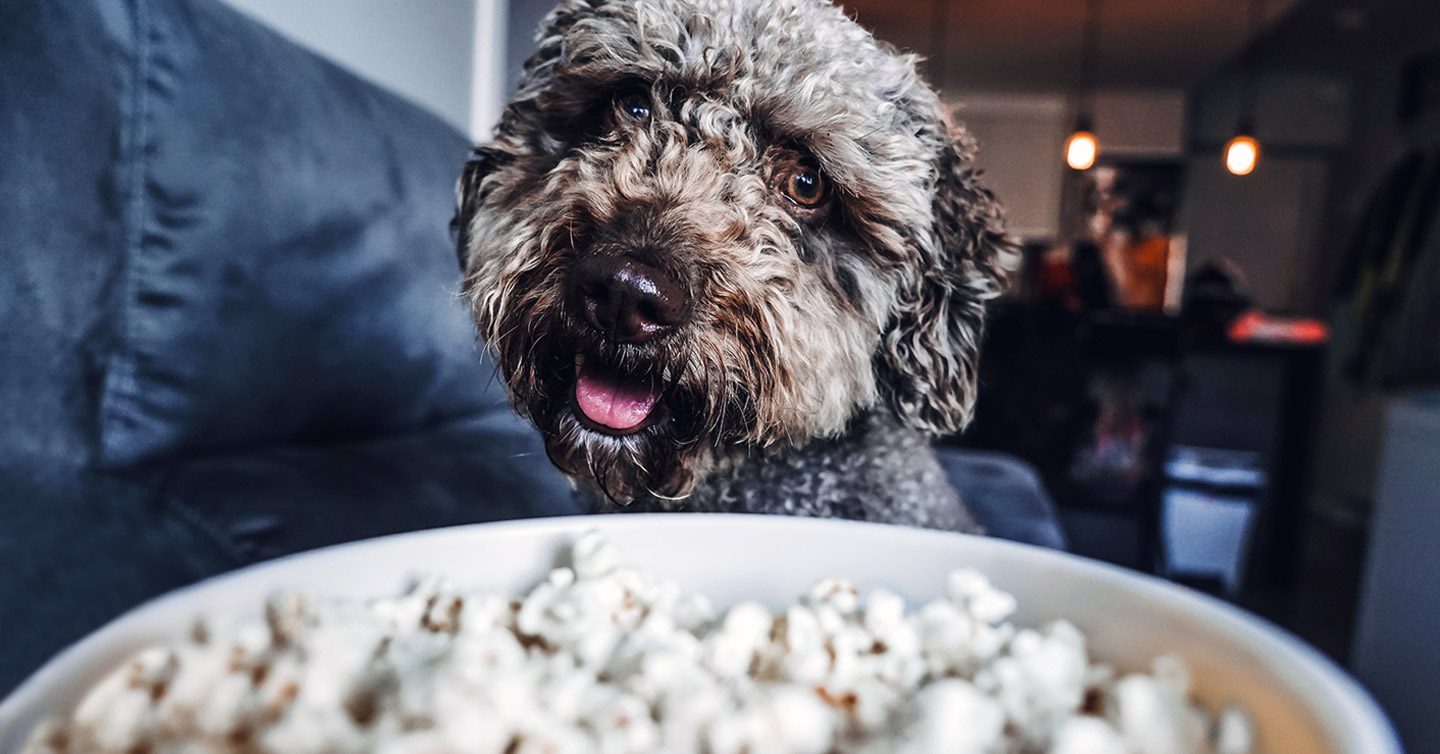Key Points:
- Yes, dogs can eat popcorn in moderation; plain, air-popped popcorn without butter or salt is best.
- Popcorn provides dogs with fiber and minerals such as magnesium, manganese, and zinc.
- Too much popcorn can lead to weight gain or an upset stomach in dogs.
A bowl of popcorn is a popular movie night snack. And where there’s food, our dogs are typically close by, hoping to snag a piece. But before tossing some to your pup, it’s important to know if dogs can eat popcorn — and if so, which types are safe.
So, can dogs eat popcorn? Yes, popcorn is a safe snack for dogs, provided that it’s plain and air-popped. There’s just one catch. All that good stuff you like to add to your popcorn — salt, seasonings, butter, oils, cheese, and sugars like caramel — are bad for your dog. As with most human food, popcorn for dogs should only be an occasional treat, as too much can lead to digestive issues and weight gain.
In this guide, we cover everything you need to know about feeding popcorn to your dog, the benefits and risks, and how to prepare popcorn safely for dogs.
How much popcorn can dogs have?
Moderation is an important part of properly feeding your dog popcorn. But how much is too much?
Veterinarians recommend that no more than 10% of a pup’s daily calories come from treats. Plain, air-popped popcorn is known to be a low-calorie snack, but the right amount for your dog’s daily caloric needs will depend on factors like size, age, breed, and activity level.
For example, if an 11-pound neutered dog at a healthy weight has a daily calorie allowance of 351, then 35 of those calories can come from treats. Meanwhile, a 10-pound puppy under four months old with a daily allowance of 654 calories could have 65 calories’ worth of treats in a day.
Is popcorn good for dogs?
Popcorn is a whole-grain food, making it a healthy treat for dogs. Corn is a common ingredient in many lower-priced pet foods and is not toxic to your dog. It’s an inexpensive way to add fiber, protein, carbs, and calories to a scientifically balanced diet. But corn is not the same as popcorn, and it makes a difference when considering nutritional health.
Nutritional value of popcorn for dogs
Air-popped popcorn is a source of carbohydrates, starch, protein, water, and fiber. One cup of air-popped popcorn has about 31 calories:
- 10% of those calories come from fat
- 77% from carbohydrates
- 13% from protein
Potential benefits of popcorn for dogs

The best reasons for your dog to get the occasional snack of popcorn are:
- High dietary fiber content
- Low in calories
- Powerful antioxidants
- Contains B vitamins
Fiber helps with digestion, reduces the risk of obesity, and carries water through the digestive system. Meanwhile, antioxidants destroy free radicals from environmental toxins that damage cells.
Popcorn is also filled with B vitamins like niacin, thiamin, and pyridoxine to support energy and cell production, regulate hormone levels, and support your dog’s immune and nervous systems. It’s also loaded with trace minerals like iron, magnesium, phosphorus, potassium, manganese, copper, and zinc. These improve your dog’s cellular function, improve skin and coat, regulate immune and nervous systems, as well as many other essential functions your dog’s body needs to keep working properly.
However, while popcorn offers some nutritional benefits, our dogs would need to eat a lot of it to reap those rewards. And we definitely don’t recommend replacing a bowl of kibble or wet food with a bowl of popcorn. That means you should think of popcorn as a tasty snack more than a healthy snack.
Potential risks of popcorn for dogs
We all know the annoying feeling of a popcorn kernel stuck between our teeth. Even with opposable thumbs, these kernels are a major pain to remove. So, just imagine how annoying this must be for our pets. And that’s just one potential risk of popcorn that pet parents need to know.

The major risks of popcorn come from the fats and sodium we like to add. These can cause gastrointestinal issues in your dog’s body and promote weight gain. Unpopped popcorn kernels may also pose a choking hazard and are not easily digested.
Here are some risks to be aware of when it comes to feeding popcorn to your dog as a crunchy treat:
- Fats and oils can cause obesity if consumed too often or in large amounts. Obesity can lead to heart problems, arthritis, and kidney disease.
- Sodium in popcorn can lead to dehydration and salt toxicity.
- Kettle corn or caramel corn have added sugars. These are especially bad for diabetic or overweight dogs.
- Peanut butter added to popcorn can also be hazardous if it contains the artificial sweetener xylitol, which is highly toxic to dogs and is among the top foods to avoid giving your pet.
- Popcorn kernel hulls can get lodged between a dog’s teeth and gums and be uncomfortable. If undetected for a long time, these can cause dental issues.
- The bags used for microwave popcorn may contain toxic chemicals (PFCs) that keep the oils from seeping through the bag lining. PFCs have been linked to cancer and other health concerns, and some people avoid microwave popcorn for this reason.
Remember: Whenever you’re offering your pup a new food, it’s always best to check with your veterinarian first. They know your dog and the safest amounts for their specific health needs.
Is popcorn safe for puppies?
Yes, it’s safe for puppies to eat popcorn, but it’s important to watch out for choking since popcorn and its kernels can easily get stuck in the throat. Breaking the popcorn into small bits and sharing just the soft white part can make it easier for your puppy to consume popcorn without discomfort.
Portion-wise, how much popcorn a puppy can eat will depend on their weight and age. Puppies, in general, have a higher calorie allowance than adult dogs.
How to prepare popcorn for dogs
As stated earlier, the safest, healthiest way to serve popcorn to your pooch is air-popped and plain. Any commercially packaged popcorn — like Smart Food, Skinny Pop, cinema-style buttered popcorn, white cheddar popcorn, kettle corn, or caramel popcorn — is not safe for your dog.

If you prefer your popcorn with added salt, butter, or seasoning, separate a small amount for your dog into a different bowl before adding toppings to your portion.
You can even go one step further by using hulless popcorn, which has smaller, more tender kernels, making it a smart choice for a dog snack.
Safe alternatives to offer as dog treats instead of popcorn
If you want to offer treats with nutritional benefits, many fruits and veggies can boost your dog’s overall health. The following foods may be a better option than popcorn:
Not only do these foods contain more vitamins, minerals, and healthy fiber than popcorn, but you can also add them to KONG toys and puzzle toys for added enrichment.
Final verdict: Plain popcorn is safe for most dogs
Popcorn during movie night can be a great treat for both you and your dog. Just make sure it’s prepared safely and fits your dog’s daily calorie guidelines.
If you follow that advice, popcorn is a tasty snack your pooch should enjoy as much as you do.
As you explore feeding human food to your pet, having a dog insurance plan is a great way to ensure that your furry friend and your wallet are protected if something goes wrong. Pumpkin pet insurance plans can help you afford the best care in the future by covering eligible vet bills.
FAQs about dogs and popcorn
- https://vetmeds.org/pet-poison-control-list/salt/#!form/PPCDonations
- https://www.animalmedicalcenterofchicago.com/dog-diet-calorie-requirements-for-dogs/
- https://www.dogsnaturallymagazine.com/5-trace-minerals-your-dog-needs-in-his-diet/
- https://www.healthline.com/health/microwave-popcorn-cancer#cancer
- https://www.healthline.com/nutrition/popcorn-nutrition-and-health
- https://www.aspca.org/pet-care/animal-poison-control/people-foods-avoid-feeding-your-pets
- https://www.petmd.com/dog/nutrition/how-many-calories-does-a-dog-need
- https://fdc.nal.usda.gov/fdc-app.html#/food-details/167959/nutrients
- https://wsava.org/wp-content/uploads/2020/07/Calorie-Needs-for-Healthy-Adult-Dogs-updated-July-2020.pdf




